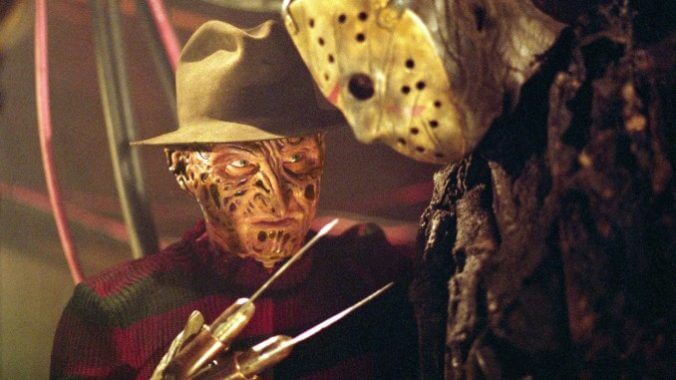20 Years Ago Saw Freddy vs. Jason, but It Was Audiences That Won

Freddy vs. Jason. The title says it all. The coming together of two titans of horror that once ruled the screens of the multiplex had been in production hell for years before its eventual 2003 release. Talks went as far back as the late ‘80s, when both killers were in something closer to their prime. 15 years later, following an overabundance of junky and absurd sequels for each franchise that further devolved the initial purpose and origins of their characters, Freddy vs. Jason was situated at a crossroads. It had to both fulfill the simple pull of its elevator pitch while finding a way to revitalize characters that had become caricatures of themselves. How do you make a movie like this without reducing it down to the shallow trappings of the central gimmick?
The answer is, you don’t. You go so all-in on the possibilities within the novelty of the premise that the idea of a “gimmick movie” becomes a pro, not a con. When you have the likes of Freddy Krueger and Jason Voorhees occupying the same space, suddenly existing within a shared universe, you can do just about whatever you want—especially with the benefit of hindsight and a collective 18 movies to learn from. As poor young stoner Bill Freeburg explains before he’s possessed by Freddy and bisected by Jason’s machete: “Anything is possible! You just don’t get it!”
Indeed, Freddy vs. Jason was a movie in danger of being helmed by someone who just didn’t get it. As both franchises became playthings of various studios and producers over the years, so much of their history was tied up in bureaucratic legal issues that it wouldn’t be far-fetched to think that whoever was hired to tackle such an endeavor wouldn’t understand what makes these characters tick, or what a movie that brings them together should be shaped as. That Freddy vs. Jason works as well as it does is an all-time horror movie miracle.
Credit is owed to co-writers Damian Shannon and Mark Swift (the scribes responsible for the very solid 2009 Friday the 13th remake and the abysmal 2017 Baywatch adaptation), who realized exactly how this movie needed to be structured. Specifically, it’s in how their story adeptly blends the styles of its two movie monsters’ worlds. At the end of the day, Freddy vs. Jason is more of a Nightmare on Elm Street sequel than a Friday one, Jason just happens to be along for the ride after being banished to Hell in his last entry, accurately titled Jason Goes To Hell: The Final Friday.
Freddy vs. Jason cleverly uses Freddy’s acuity in tandem with Jason’s muscle: Jason is used as the heavy in Freddy’s plan to torment an Elm Street that has forgotten him, seeing as he needs the townspeople to fear him to haunt them. Jason is cast out of Hell to Elm Street, and once the bodies he’s responsible for start showing up, the older residents that remember the legend of Freddy begin to whisper his name once again, setting the stage for his return. But once Freddy realizes Jason is taking the kills that should be his, he sets out on a path for revenge.
It’s far more elaborately constructed and thought-out than it necessarily needed to be—I’m continually shocked by the effort put in to make this a bonafide slasher film on top of the feud that it all ultimately builds up to. It’s knowingly cheeky, but there’s a natural escalation on the way to the climactic battle between the two; the story never feels like a limp excuse to get to the showdown. This is not to say that it rises above your typical slasher fare—at its heart it’s still horny, drunk, dumb teens getting mowed down by the guys on the poster—but the film doesn’t shortchange its audience in ways it could definitely get away with. There’s a legitimately interesting thematic throughline about a generation of kids paying for the trauma that their parents never properly reckoned with and hid away from them, with everyone now being forced to pay the price. You would never think it, but the story of Freddy vs. Jason is potent.
-

-

-

-

-

-

-

-

-

-

-

-

-

-

-

-

-

-

-

-

-

-

-

-

-

-

-

-

-

-

-

-

-

-

-

-

-

-

-

-








































